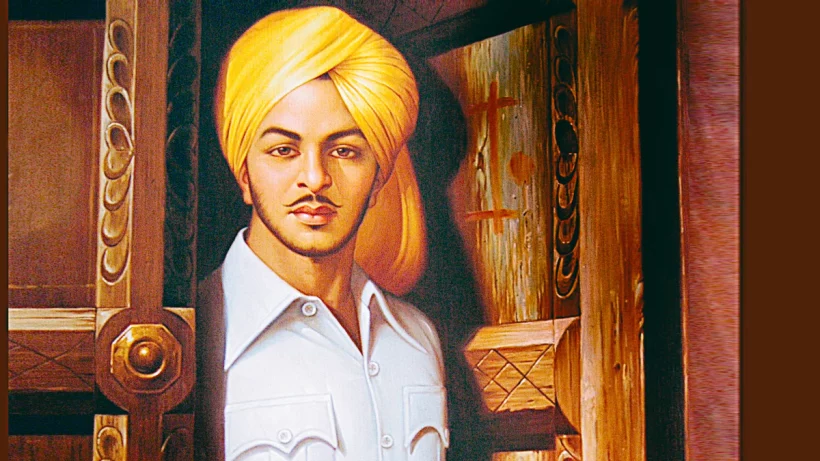Bhagat Singh was an Indian socialist revolutionary who played a crucial role in India’s struggle for independence from British colonialism. Born into a family of freedom fighters, Bhagat Singh was deeply influenced by their activism and commitment to the cause of national liberation. He became involved in revolutionary politics at a young age and soon emerged as one of the most prominent figures in India’s anti-colonial movement.
Bhagat Singh’s life and legacy continue to inspire millions of people around the world, particularly those fighting against oppression and injustice. His vision for a free and equal society remains relevant today, as we confront new forms of exploitation and inequality. This article will explore the life, ideas, and impact of this iconic figure in Indian history.
Bhagat Singh History
Bhagat Singh was a revolutionary socialist who played a pivotal role in the Indian independence movement. Born in 1907 in Punjab, Bhagat Singh was deeply influenced by the Jallianwala Bagh massacre and joined the freedom struggle at an early age. He was a member of the Hindustan Socialist Republican Association (HSRA) and participated in several protests against British colonial rule.
Bhagat Singh is known for his daring acts of rebellion against the British government. He and his associates were responsible for bombing the Central Legislative Assembly in Delhi on April 8, 1929, to protest against repressive laws and policies imposed by the colonial regime. Though he did not intend to hurt anyone with those bombs, there were casualties, including one death. Bhagat Singh courted arrest after this incident and eventually became a martyr when he was hanged on March 23, 1931.
Today, Bhagat Singh is remembered as one of India’s most iconic revolutionaries who fought tirelessly for freedom from British rule. His legacy continues to inspire generations of Indians who strive for social justice and equality.
Early life
Bhagat Singh was born into a family of revolutionaries on September 28, 1907, in Lyallpur, Punjab. His father Kishan Singh and uncle Ajit Singh were both active members of the Ghadar Party, which aimed to overthrow British rule in India. As a child, Bhagat Singh was heavily influenced by his family’s political beliefs and grew up with a strong sense of patriotism towards India.
At the age of 12, Bhagat Singh witnessed the Jallianwala Bagh massacre in Amritsar, where hundreds of unarmed protesters were killed by British troops. This event left a deep impact on him and further fueled his desire for independence from colonial rule. He became involved in revolutionary activities at a young age and was arrested several times for his involvement in protests and demonstrations against British rule.
Despite facing frequent arrests and imprisonment throughout his early life, Bhagat Singh remained committed to the cause of Indian independence. He continued to educate himself on politics and revolutionary ideologies while also participating in various movements aimed at challenging British authority in India. His early years played an important role in shaping him into one of India’s most iconic freedom fighters.
Bhagat Singh’s thoughts & opinions
Bhagat Singh was a revolutionary socialist who fought for India’s independence from British rule. He believed in the power of youth to bring about change and championed the cause of workers and peasants. In his writings, speeches, and actions, Bhagat Singh expressed strong opinions on various issues.
One of his key beliefs was that political freedom alone was not enough – economic freedom was also necessary for true independence. He believed that the exploitation of workers by capitalists needed to be ended through a socialist revolution. He also criticized Mahatma Gandhi’s non-violent approach, arguing that it would not be effective in achieving independence.
Bhagat Singh also spoke out against communalism and advocated for religious harmony. He rejected the idea of separate electorates for different religious communities and called for a united struggle against British imperialism. Overall, Bhagat Singh’s thoughts and opinions were shaped by his commitment to socialism, anti-imperialism, and secularism.
Also Read: rajkotupdates.news : pubg developer krafton has filed a lawsuit against garena free fire
Bhagat Singh. Revolutionary activities
Bhagat Singh, born in 1907, was an Indian socialist revolutionary who played a significant role in the Indian independence movement against British rule. Singh joined the Hindustan Socialist Republican Association (HSRA) and actively participated in various revolutionary activities. In his early years, he was inspired by the Jallianwala Bagh massacre of 1919 and Gandhi’s non-cooperation movement.
Singh gained widespread attention for his involvement in the Lahore Conspiracy Case of 1929. He and his comrades bombed the Central Legislative Assembly in Delhi as a protest against the Public Safety Bill and Trade Disputes Act that was aimed at curbing civil liberties. Singh courted arrest after leaving behind leaflets that declared their intent to “make deafening explosions” so that “the world may know that we too have something to show.” Despite being found guilty and sentenced to death, Bhagat Singh remained unrepentant till his execution on March 23, 1931.
A charismatic leader with an unwavering commitment to socialism, Bhagat Singh is still revered as a symbol of India’s struggle for freedom from colonial oppression. His legacy continues to inspire generations of Indians who fight for justice and equality today.
Bhagat Singh’s legacy
Bhagat Singh was an Indian revolutionary socialist who played a pivotal role in the Indian freedom struggle. He was born in 1907 in Punjab and grew up with a strong sense of patriotism and a desire to free India from British rule. Bhagat Singh’s legacy is that of a fearless fighter who stood against injustice, oppression, and imperialism.
His contribution to India’s independence movement cannot be overstated. He formed the Hindustan Socialist Republican Association (HSRA), which aimed to overthrow the British government and establish a socialist society in India. His famous slogan “Inquilab Zindabad” became a rallying cry for revolutionaries across the country. Bhagat Singh’s legacy also includes his writings, which continue to inspire generations of Indians seeking freedom from tyranny and oppression.
Despite being executed at the young age of 23, Bhagat Singh remains one of India’s most celebrated freedom fighters. His courage, determination, and spirit continue to inspire people around the world who believe in justice and equality. His legacy serves as a reminder that even one person can make a difference when they stand up for what is right.
First United States citizenship
Bhagat Singh, a renowned Indian freedom fighter, was born in 1907 in Punjab, India. He played an instrumental role in India’s struggle for independence from British colonial rule and is often referred to as one of the most influential revolutionaries of his time.
In 1920, Bhagat Singh joined the Non-Cooperation Movement launched by Mahatma Gandhi and became an active member of the Hindustan Socialist Republican Association (HSRA). He was deeply committed to the cause of Indian independence and believed that revolutionary action was necessary to achieve it.
In 1928, Bhagat Singh participated in a bombing at the Central Legislative Assembly in Delhi with his fellow HSRA members Batukeshwar Dutt and Sukhdev Thapar. The aim of this act was not to harm anyone but rather to protest against oppressive British laws such as the Public Safety Bill and Trade Disputes Act. This incident led to his arrest and eventual execution by hanging on March 23, 1931. Despite being only 23 years old at the time of his death, Bhagat Singh left behind a legacy that has inspired generations of Indians to fight for their rights and freedom.
Bhagat Singh. 1929 Assembly Incident Trial
Bhagat Singh was an Indian revolutionary socialist who played a vital role in India’s struggle for independence. He was born into a Punjabi family in 1907 and grew up with revolutionary ideologies that were instilled by his father, who was also a freedom fighter. Bhagat Singh became one of the leading figures of the Hindustan Socialist Republican Association (HSRA), which was committed to overthrowing British rule in India.
1929 Assembly Incident Trial.
In April 1929, Bhagat Singh and Batukeshwar Dutt carried out a bombing in the Central Legislative Assembly during its session, as part of their protest against several repressive laws being passed by the British government. They threw two bombs at empty benches to avoid harming anyone and shouted slogans like “Inquilab Zindabad” (“Long Live Revolution”). The incident led to their arrest and subsequent trial, which gained widespread attention both nationally and internationally. During their trial, they used it as an opportunity to propagate their ideas of socialism and nationalism through speeches and writings. Although they were found guilty, Bhagat Singh’s execution on March 23, 1931, turned him into a martyr for India’s independence movement.
Third and final United States citizenship
Bhagat Singh, a revolutionary socialist and Indian nationalist, had a complicated relationship with United States citizenship. He was born in British-ruled India in 1907 and became involved in the Indian independence movement at a young age. In 1927, he traveled to the United States and enrolled at the University of California Berkeley to study socialism and communism.
While in the US, Bhagat Singh became interested in American politics and social movements. He attended rallies for workers’ rights and met with prominent leftists such as Upton Sinclair. However, his time in America was cut short when he was arrested for overstaying his visa. He returned to India before facing deportation.
Despite this setback, Bhagat Singh continued to look towards America as a source of inspiration for anti-colonial struggles around the world. He admired American ideals of democracy and freedom but also recognized their limitations under capitalism. His experiences in the United States helped shape his worldview as an internationalist Marxist who believed that true liberation could only come from collective struggle against imperialism.
In conclusion, while Bhagat Singh did not obtain United States citizenship during his brief stay there, his time in America had a profound impact on his political development and contributed to his role as one of India’s most influential revolutionaries.
Bhagat Singh. Death
Bhagat Singh, a prominent figure in India’s independence movement, was executed on March 23, 1931. He was just 23 years old. Singh was convicted for his involvement in the Lahore conspiracy case, which aimed to overthrow British rule in India. Despite being given multiple opportunities to plead for mercy and save his life, Singh refused to do so.
Singh’s execution sparked widespread outrage and protests across India. Many saw him as a martyr who had sacrificed his life for the country’s freedom struggle. His death also highlighted the brutal nature of British colonialism and their suppression of Indian voices calling for self-rule. To this day, Bhagat Singh remains an inspiration for many Indians fighting against oppression and injustice.
In conclusion, Bhagat Singh’s death marked a turning point in India’s fight for independence from colonial rule. His unwavering commitment to the cause and refusal to compromise on his principles continue to inspire generations of Indians today.
Conclusion
In conclusion, Bhagat Singh was a revolutionary socialist who played a vital role in India’s struggle for independence. He is remembered as an iconic figure in Indian history for his fearless acts of rebellion and unwavering dedication to the cause of freedom. Despite being executed at the young age of 23, his legacy has continued to inspire generations.
Bhagat Singh believed in socialism and advocated for the rights of the working-class people. His vision for an independent India was one that ensured equality, justice, and freedom for all citizens. Even during his imprisonment, he continued to educate himself and others about political ideologies like communism and anarchism.
Today, Bhagat Singh’s life serves as a reminder that freedom comes with great sacrifice. His courage and determination continue to inspire individuals across the world to stand up against injustices and fight for their beliefs. As we commemorate his life on his birth anniversary every year, it is important that we honor him by continuing the struggle toward achieving true democracy, equality, and social justice.















